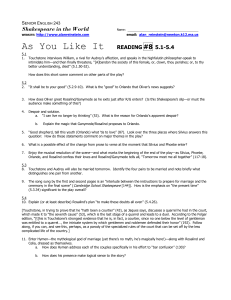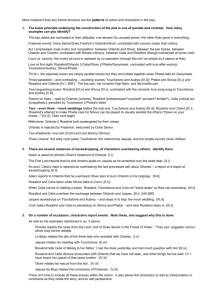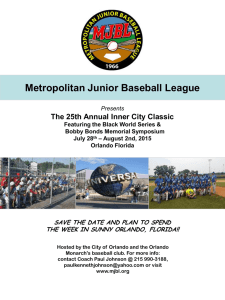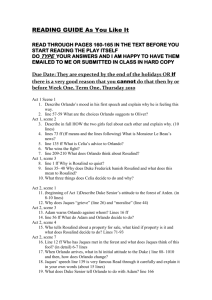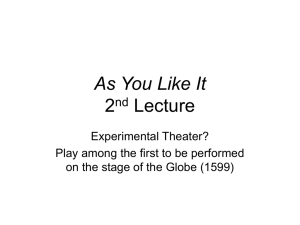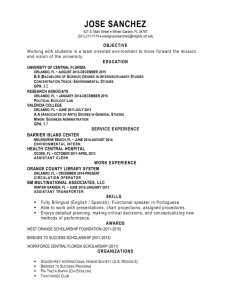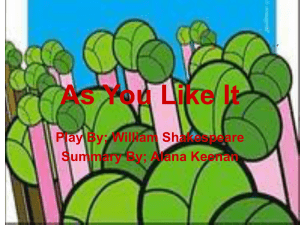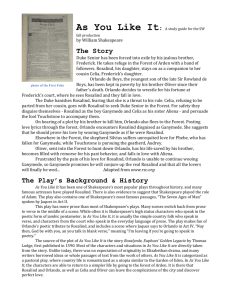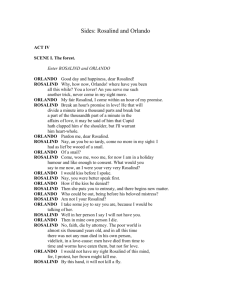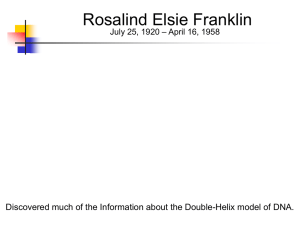doc
advertisement
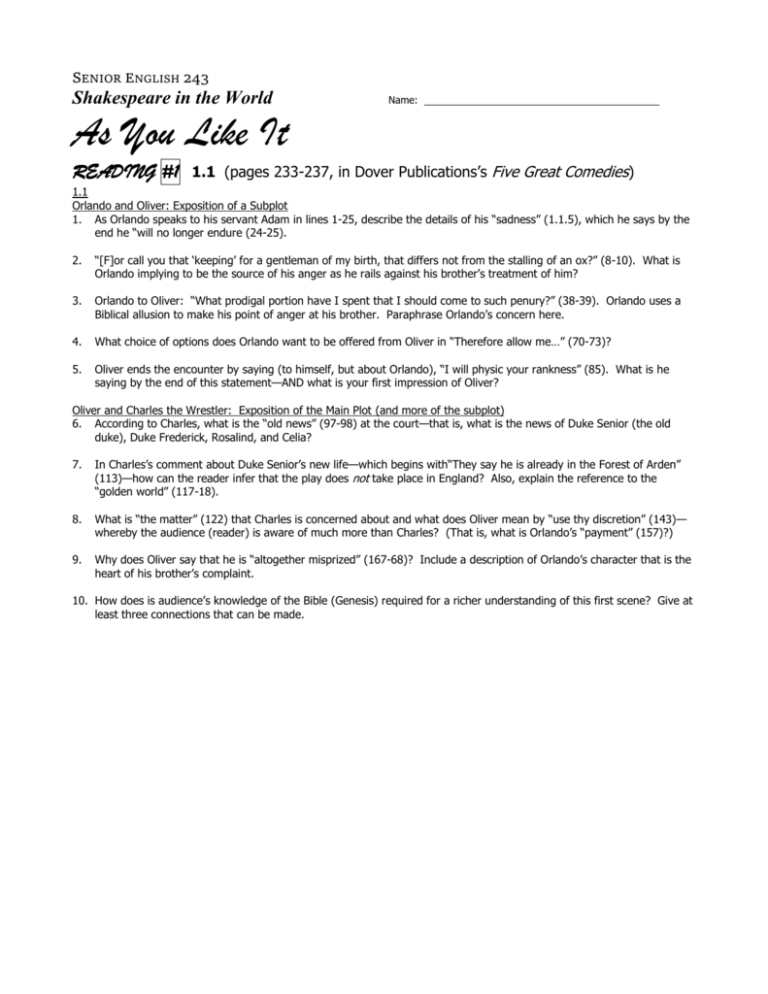
SENIOR ENGLISH 243 Shakespeare in the World Name: As You Like It READING #1 1.1 (pages 233-237, in Dover Publications’s Five Great Comedies) 1.1 Orlando and Oliver: Exposition of a Subplot 1. As Orlando speaks to his servant Adam in lines 1-25, describe the details of his “sadness” (1.1.5), which he says by the end he “will no longer endure (24-25). 2. “[F]or call you that ‘keeping’ for a gentleman of my birth, that differs not from the stalling of an ox?” (8-10). What is Orlando implying to be the source of his anger as he rails against his brother’s treatment of him? 3. Orlando to Oliver: “What prodigal portion have I spent that I should come to such penury?” (38-39). Orlando uses a Biblical allusion to make his point of anger at his brother. Paraphrase Orlando’s concern here. 4. What choice of options does Orlando want to be offered from Oliver in “Therefore allow me…” (70-73)? 5. Oliver ends the encounter by saying (to himself, but about Orlando), “I will physic your rankness” (85). What is he saying by the end of this statement—AND what is your first impression of Oliver? Oliver and Charles the Wrestler: Exposition of the Main Plot (and more of the subplot) 6. According to Charles, what is the “old news” (97-98) at the court—that is, what is the news of Duke Senior (the old duke), Duke Frederick, Rosalind, and Celia? 7. In Charles’s comment about Duke Senior’s new life—which begins with“They say he is already in the Forest of Arden” (113)—how can the reader infer that the play does not take place in England? Also, explain the reference to the “golden world” (117-18). 8. What is “the matter” (122) that Charles is concerned about and what does Oliver mean by “use thy discretion” (143)— whereby the audience (reader) is aware of much more than Charles? (That is, what is Orlando’s “payment” (157)?) 9. Why does Oliver say that he is “altogether misprized” (167-68)? Include a description of Orlando’s character that is the heart of his brother’s complaint. 10. How does is audience’s knowledge of the Bible (Genesis) required for a richer understanding of this first scene? Give at least three connections that can be made. Passages of Interest Choose ONE line or passage from the reading that interests you for ANY reason and that you want to discuss with a classmate, the teacher, or the entire class. Maybe it’s a passage that you don’t understand. Write it down, along with the page number and the explanation for your choosing it. FILL THE GIVEN LINES BELOW. PASSAGE: RESPONSE: READING #2 1.2-1.3 (pages 237-248) 1.2 [In Celia’s wanting Rosalind to be happier, we get some more exposition about the banishment of Duke Senior, Rosalind’s father, and the situation of Rosalind, along with the love that the two young women have for each other.] 1. When Rosalind offers to change the subject, to “devise sports” (1.2.23-24), and asks Celia, “[W]hat think you of falling in love” (24-25), how does Celia respond by making a pun with the word sport? And explain the direction she gives to Rosalind about falling in love? 2. The two women discuss Fortune, women, and Nature: a. How are Fortune’s “benefits…mightily misplaced” (35)? b. How does Fortune “mistake…her gifts to women” (36)? c. Explain the difference, according to Rosalind, between Fortune and Nature. The discussion of Fortune lasts until Celia addresses Touchstone; think through and discuss the importance of the difference. 3. Work through the discussion between Celia and the fool Touchstone about foolishness and wisdom. What is the truth Touchstone hits on that Celia acknowledges? 4. In lines 176-186 (“I beseech you, punish me not with your hard thoughts”), Orlando makes the case to Celia and Rosalind for not standing in his way of wrestling with Charles. What does his reasoning explain why he might have chosen to wrestle Charles in the first place? 5. Sir Rowland de Boys. a. How does Duke Frederick respond to Orlando’s declaring himself to be “the youngest son of Sir Rowland de Boys” (217-18)? b. 6. How should the audience use logic to view the character of Frederick—combined with Rosalind’s response to the connection to Sir Rowland? How is Orlando affected when Rosalind gives him a chain to wear as a reward and token of esteem? In addition, how is the word overthrown doubly used by both Rosalind and Orlando for the audience’s benefit? 1.3 7. Note the line that is also part of her response: “O, how full of briers is the working-day world!” (11-12). What is the significance of this comment alongside the world of the forest that awaits them? 8. What could likely be the motivation for Duke Frederick’s sudden decision to banish Rosalind “from our court” (41)? [Note the duke’s comment that impugns “all traitors”: “If their purgation did persist in words / They are as innocent as grace itself” (55-57), remembering that one of Shakespeare’s greatest moments are his comments on the universal truths of human experience.] 9. Rosalind’s reasoning against the duke’s accusations of her treason (“I trust thee not” (58), says the duke) shows off her rich intelligence. List two compelling points that she makes in her defense. [Note Celia’s comment that implies that Duke Frederick’s usurping the throne was a long time ago: “I was too young at that time” (74). How might this knowledge shape your view of Duke Senior’s banishment?] 10. Explain Rosalind’s concern: “Beauty provoketh thieves sooner than gold” (116). Passages of Interest Choose ONE line or passage from the reading that interests you for ANY reason and that you want to discuss with a classmate, the teacher, or the entire class. Maybe it’s a passage that you don’t understand. Write it down, along with the page number and the explanation for your choosing it. FILL THE GIVEN LINES BELOW. PASSAGE: RESPONSE: READING #3 2.1-2.6 (pages 249-259) 2.1—The Forest 1. Meet Duke Senior: His opening comment on his life in exile. a. Paraphrase Duke Senior’s main message in this opening speech that he makes to the men who are also exiles from the court. 2. What is the translation that Amiens refers to when he responds to the Duke’s opening speech? 3. Deer. a. b. “And yet…” (22). What does Duke Senior have to say about the “dappled fools” (2.1.22), the deer that he’s eager to kill for a meal? (Keep your eye on the role that deer in particular and animals in general play in the play.) Which of Shakespeare’s words effectively evoke the emotional scene of the “poor sequestered stag” (34) that Amiens sees earlier in the day? 2.2—Back at the Court 4. What is the reason for Duke Frederick’s hot temper in this short scene and how does he plan to cool it? 2.3 5. “O, what a world is this when what is comely / Envenoms him that bears it!” (2.3.14-15). How does Orlando’s servant Adam see Orlando’s “virtues” (12) as “traitors” (13)? 6. Orlando praises Adam, “[H]ow well in thee appears / The constant service of the antique world” (57-58) and conjures an olden world where human virtues were great than they are today. How are “these times” (60) different, according to Orlando, from the olden ones? (Or is he only speaking about the world of the city/court?) [Just note the lovely moment of Orlando’s acquiescence in “But come thy ways. We’ll go along together…We’ll light upon some settled low content” (67-69) as the two depart from the world of the court toward a humbler state of being.] 2.4—Back in the Forest [OPTIONAL/HONORS] Touchstone’s comment upon the threesome’s arrival in the Forest of Arden—“When I was at home I was in a better place, but travelers must be content” (2.4.16-17)—implies an invitation for the audience to compare the two worlds. What meaning would you give to his line, “but travelers must be content”? (That is, how would you direct him to say it?) 7. The conversation between Silvius and Corin is the introduction of the court people to the pastoral, the world of the shepherds. How would you direct their discussion on love—idealizing the innocent and honorable lives of shepherds or as a satire of the pastoral, in which the shepherds appear foolish. Explain your thinking. 8. Explain: “Alas, poor shepherd, searching of thy wound, / I have by hard adventure found mine own” (43-44). [Note: The silliness of love: “We that are true lovers run into strange capers. But as all is mortal in nature, so is all nature in love mortal in folly (54-55) Remember that the play, in addition to being about the worlds or the court and the country, is also about LOVE. There are four love pairings in the play. Now we’ve got two.] 9. Celia, as Aliena, makes her first impression of the forest known: “I like this place, / And willingly could waste my time in it” (97-98). How does this comment fit well with the city-dweller’s conventional perspective of life in the country? 2.5 Music. As You Like It is one of Shakespeare’s most musical plays. And now we meet Jacques the Melancholy, who “can suck melancholy out of a song as a weasel sucks eggs” (2.5. 13-14). In each of the three places for song in Scene 5, find at least one statement/line that represents the Duke’s earlier thoughts (Scene 1) that “sweet are the uses of adversity” (2.1.12)? Why might Jacques want to hear “more”? 2.6 10. List the words that Orlando uses in his speech to Adam that suggest his first impression of the forest. Passages of Interest Choose ONE line or passage from the reading that interests you for ANY reason and that you want to discuss with a classmate, the teacher, or the entire class. Maybe it’s a passage that you don’t understand. Write it down, along with the page number and the explanation for your choosing it. FILL THE GIVEN LINES BELOW. PASSAGE: RESPONSE: READING #4 2.7—3.2 (pages 259-277) 2.7 1. Jacques reports the philosophy of the fool (Celia’s fool, Touchstone): “From hour to hour we ripe and ripe, / And then from hour to hour we rot and rot, / And thereby hangs a tale.” How does this represent a truth about the human experience that might reasonably attract Jacques? 2. Jacques wants to be a fool, as Touchstone is (with a motley [multi-colored] coat), so that he can “have liberty…to whom I please, for so fools have” (49-51). Try to unpack/paraphrase Jacques’s complicated reasoning in how fools can successfully satirize/attack the higher-ups: He that a fool doth very wisely hit Doth very foolishly, although he smart, Not to seem senseless of the bob. If not, The wise man’s folly is anatomized (55-58) 3. Duke Senior and Jacques disagree on the effect of the satirist’s role in the community. a. What does Jacques believe will be the result of his having “leave / To speak my mind” (60-61)? b. What does the Duke mean in lines 66-71, which begin with “Most mischievous foul sin in chiding sin”? c. Then, finally, paraphrase the climax of Jacques’s rebuttal: If it do him right, Then he hath wronged himself. If he be free, Why then my taxing like a wild goose flies Unclaimed of any man. (87-90) 4. Responding to Duke Senior, how does Orlando explain that he has lost “smooth civility” (101)? 5. Orlando is disarmed (literally by the end of his response) by Duke Senior’s hospitality. Two things to note from this speech: a. How does Orlando explain his violent entrance? b. What does Orlando see to be lost and neglected by Duke Senior and his men? 6. Explain the deer motif that is brought back into the play by Orlando. In addition, how is the nature of his relationship with his servant Adam (which the deer metaphor examines) reflected in the Seven Ages of Man speech that is about to come from Jacques? Read Jacques’s famous speech (“All the world’s a stage…”) and soak up the language. Which of the seven images from the seven ages is the most notable to you? 3.1 7. Two conditions from Duke Frederick to Oliver: a. What is the consequence if Oliver does not bring back Orlando (“dead or living” (3.1.6) within a year? b. What is the consequence if Oliver’s lack of responsibility for Celia being gone is not explained by “[his] brother’s mouth” (11)? 2. Oliver: I never loved my brother in my life Duke Frederick: More villain thou. (3.1.14-15) What is the ironic significance of Duke Frederick’s response to Oliver? 3.2 Orlando Alone 8. “O Rosalind, these trees shall be my books, / And in their barks my thoughts I’ll character” (3.2.5-6). Briefly, what is Orlando’s plan for expressing his love for Rosalind? Touchstone and Corin 9. Touchstone’s and Corin’s Philosophies. a. Read over Touchstone’s comments on life in the country and life in the court in lines 13-21 (“Truly, shepherd, in respect of itself, it is a good life; but in respect that it is a shepherd’s life, it is naught…”) Is there merit to it—or is it meant to be a full of nonsense? Explain your thinking. b. Next, what about Corin’s response in the ten lines that follow (“I know the more one sickens, the worse at ease he is” [2324])? Do you see merit in Corin’s simplicity? Is it unintended foolishness? Or is he mocking Touchstone with deliberate nonsense? How would you direct this scene? Rosalind, Celia, and Touchstone Read Orlando’s Poems 10. Touchstone: “The tree yields bad fruit” (117), referring to the bad poems of Orlando tacked to the trees. Remember that Orlando referred to himself, while with Adam in 2.3, as “a rotten tree / That cannot so much as a blossom yield” (2.3.64-65). Explain how this metaphor is extending itself in the country. a. Then try to figure out Rosalind’s clever rejoinder to Touchstone—“I’ll graft it with you, and then I’ll graft it with a medlar” (118-119)—to see how she saves the “bad fruit” of Orlando’s poems. 11. Celia: Trow you (Can you guess) who hath done this? Rosalind: Is it a man? Celia: And a chain, that you once wore, about his neck. Rosalind clearly must know that this is Orlando, but this begins a section of teasing between the two women that culminates in Celia’s confirmation that the poet is in fact “Orlando” (222)? a. How does Rosalind respond the moment Celia says the name? [Note Celia’s statement about the nature of love: “It is as easy to count atomies as to resolve the propositions of a lover” (236-37).] Orlando and Jaques 12. Enjoy the clever wordplay in the conversation between Orlando and Jaques, which ends with them calling each other “good Signior Love” and “Monsieur Melancholy” (295-96). Choose one line or rejoinder that you like in the conversation. Rosalind and Orlando 13. How does Rosalind respond to Orlando’s comment that “[t]here’s no clock in the forest” (305)? And note the beginning of Rosalind’s great wit, for which her character is most famous. 14. Rosalind speaks about time as it relates to four types of people. For whom does it trot (go slowly), amble (more quickly), gallop (fast), and finally stay still (stop altogether)? 15. Describe the “manner” (414) in which Rosalind plans to “cure” Orlando of his lovesickness. Passages of Interest Choose ONE line or passage from the reading that interests you for ANY reason and that you want to discuss with a classmate, the teacher, or the entire class. Maybe it’s a passage that you don’t understand. Write it down, along with the page number and the explanation for your choosing it. FILL THE GIVEN LINES BELOW. PASSAGE: RESPONSE: READING #5 3.3-4.3 (pages 279-298) 3.3 1. Audrey is a country woman and Touchstone is wooing her (strangely). Touchstone to Audrey: “Truly, I wish the gods had made thee poetical” (3.3.14-15). Follow the text for the next 25 lines. What, according Touchstone, does it mean to be “poetical” and why does he want Audrey to be so? [Note about the words honest and honesty. “Throughout this conversation with Audrey, the words honest and honesty mean “chaste” and “chastity,” the common meaning in Shakespeare when the words are applied to women” (Folger Shakespeare Library’s As You Like It, 118)] 2. How does the scene of Audrey and Touchstone comment on the previous scene, which ends with Rosalind and Orlando? 3.4 3. “’Was’ is not is’” (3.4.29). What are Celia and Rosalind arguing about? [“But what talk we of fathers when there is such a man as Orlando” (36-37). Note that Rosalind casually reports that has seen her father (“met the Duke yesterday” (33)) and then says nothing more of it.] 3.5 4. Choose a line in Phoebe’s long response to Silvius’s “do not scorn me” (3.5.1) request that best shows her feelings for Silvius. 5. Paraphrase one of the great insults of the play/Shakespeare: “Sell while you can; you are not for all markets” (65). 6. “I will be bitter with him and passing short” (149). What is Phoebe’s plan for connecting with Ganymede? 4.1 [This is really a good scene to listen to.] 7. Rosalind’s response to Jaques. Just before they part she says, “I had rather have a fool to make me merry than experience to make me sad” (30-31) and then her final words make up advice to him in “Look you lisp and wear strange suits…” (37) How is the audience intended to interpret their relationship? 8. How late is Orlando to his meeting with Rosalind, and how does she criticize him for it? [There is a discussion about horns, which relates to the horns on a cuckold, a man whose wife is cheating on him… ] 9. There’s a lot talk in this scene. Note how Rosalind tries to undercut the traditional views of love. a. What does she say about lovers speaking and kissing, responding to Orlando’s, “I would kiss before I spoke” (76)? b. And what about dying for love, when Orlando says “I die” (98) if he cannot have Rosalind? [Note Rosalind’s comment about loving desire in, “Why then, can one desire too much of a good thing?” (128-29). This is where the phrase, according to the Oxford English Dictionary comes from.] 10. Rosalind’s response to Orlando’s proclamation that he will love Rosalind “[f]orever and a day” (152) is a cool depiction of wooing and marriage. a. How are men like April and then December? b. And though women are sweet like May when they are being wooed, what will they be like when they are married? Give a couple of examples. 4.2 11. How do you square Jaques’s support for the killer of the deer, in “Let’s present him to the Duke like a Roman conqueror” (4.2.3-4) with his reported comment in 2.1 that the killers of deer were “mere usurpers, tyrants, and what’s worse, / To fright the animals and to kill them up / In their assigned and native dwelling place” (2.1.64-66)? 12. And so how does the scene comment on the rest of the play? (Why is the scene really here?) 4.3 13. Phoebe’s letter to Rosalind. Recall Phoebe’s motivation in 3.5 to “write him (Ganymede) a taunting letter” (144). How does Rosalind argue that the letter must be of Silvius’s “device” (21) and that Phoebe could not have written it? 14. Oliver’s account. Follow along with Oliver’s account of his reunion with Orlando in the forest a. Give the significant details of the scene where Orlando comes about and saves the “wretched, ragged man, o’ergrown with hair” (112), who is his brother, Oliver. b. Explain Oliver’s comment: “’Twas I, but ‘tis not I. I do not shame / To tell you what I was since my conversion / So sweetly tastes, being the thing I am” (143-145). c. “He sent me hither” (161). Why was Oliver sent to Ganymede and Aliena? 15. What causes Rosalind to faint—and how does she defend herself against Oliver’s criticism, “You a man? You lack a man’s heart” (173-174)? Passages of Interest Choose ONE line or passage from the reading that interests you for ANY reason and that you want to discuss with a classmate, the teacher, or the entire class. Maybe it’s a passage that you don’t understand. Write it down, along with the page number and the explanation for your choosing it. FILL THE GIVEN LINES BELOW. PASSAGE: RESPONSE: READING #6 5.1-5.4 + Epilogue (pages 299-311) 5.1 1. Touchstone interviews William, a rival for Audrey’s affection, and speaks in the highfalutin philosopher-speak to intimidate him—and then finally threatens, “[A]bandon the society of this female, or, clown, thou perishes; or, to thy better understanding, diest” (5.1.50-52). 5.2 2. “It shall be to your good” (5.2.9-10). What is the “good” to Orlando that Oliver’s news suggests? 3. How does Oliver greet Rosalind/Ganymede as he exits just after R/G enters? (Is this Shakespeare’s slip—or must the audience make something of this?) 4. Despair and solution. a. “I can live no longer by thinking” (53). What is the reason for Orlando’s apparent despair? b. Explain the magic that Ganymede/Rosalind proposes to Orlando. 5. “Good shepherd, tell this youth (Orlando) what ‘tis to love” (87). Look over the three places where Silvius answers this question: How do these statements comment on major themes in the play? 6. What is a possible effect of the change from prose to verse at the moment that Silvius and Phoebe enter? 7. Enjoy the musical resolution of the scene—and what marks the beginning of the end of the play—as Silvius, Phoebe, Orlando, and Rosalind confess their loves and Rosalind/Ganymede tells all, “Tomorrow meet me all together” (117-18). 5.3 8. Touchstone and Audrey will also be married tomorrow. Identify the four pairs to be married and note briefly what distinguishes one pair from another. 9. The song sung by the first and second pages is an “interlude between the instructions to prepare for marriage and the ceremony in the final scene” (Cambridge School Shakespeare [144]). How is the emphasis on “the present time” (5.3.34) significant to the play overall? 5.4 10. Explain (or at least describe) Rosalind’s plan “to make these doubts all even” (5.4.26). [Touchstone, in trying to prove that he “hath been a courtier” (43), as Jaques says, discusses a quarrel he had in the court, which made it to “the seventh cause” (53), which is the last stage of a quarrel and leads to a duel. According to the Folger edition, “[t]his is Touchstone’s strongest evidence that he is, in fact, a courtier, since no one below the level of gentleman was entitled to a quarrel…, the intricate system by which gentlemen and noblemen defended their honor” (192). Follow along, if you can, and see this, perhaps, as a parody of the specialized rules of the court that can be set off by the less complicated life of the country.] 11. Enter Hymen—the mythological god of marriage (yet there’s no myth, he’s magically here!)—along with Rosalind and Celia, dressed as themselves. a. How does Hymen address each of the couples specifically in his effort to “bar confusion” (130)? b. How does his presence make logical sense to the story? 12. Another Jaques—Jaques de Boys. Briefly summarize his report (his “tidings to this fair assembly” (158)) of Duke Frederick. 13. “To him will I” (190). What is the new plan of Jaques (the Melancholy, that is)? And consider how it differs from Touchstone’s decision to marry, considering that both of these new directions involve remaining away from the court? Epilogue 14. “My way is to conjure you” (11), says Rosalind, addressing the audience directly. How does this fit the final message of the play? 15. What is the significance of Rosalind’s phrase “If I were a woman” (17) and how does this further complicate the gender arrangements of the play? Passages of Interest Choose ONE line or passage from the reading that interests you for ANY reason and that you want to discuss with a classmate, the teacher, or the entire class. Maybe it’s a passage that you don’t understand. Write it down, along with the page number and the explanation for your choosing it. FILL THE GIVEN LINES BELOW. PASSAGE: RESPONSE:
